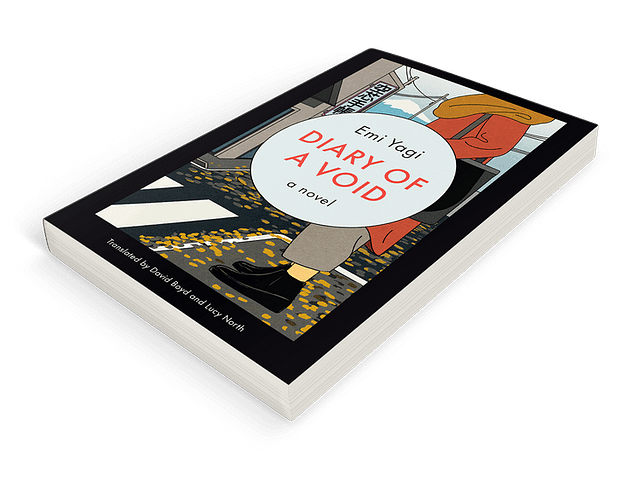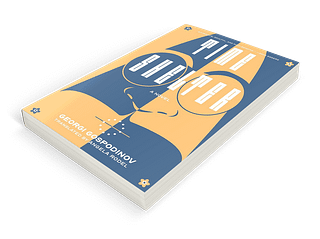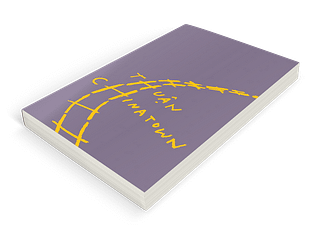Book Review Online
Play Stupid Games, Win Stupid Prizes
On Emi Yagi’s novel, Diary of a Void
By Rosemarie Ho

Diary of a Void
Emi Yagi
Translated by David Boyd and Lucy North
Viking, $23
When Shibata lies to her supervisor that she is pregnant, she takes pains to note that she doesn’t consider it an act of resistance. It’s an experiment: she wants to know if any of her male colleagues at the paper manufacturing company will take over her menial chores, like cleaning out the coffee cups brimming with cigarette stubs after a meeting. As the only woman in her section, Shibata, the narrator of Emi Yagi’s debut novel, Diary of a Void, is expected to conduct general upkeep of the office in addition to her already heavy workload. Sensing her chance, she requests to leave the Tokyo office at five on the dot until she gets over her “morning sickness.” Her bewildered bosses acquiesce. “What seemed of greatest concern to my bosses, rather than when I could clock out, was the question of the coffee,” Shibata says, not entirely without bitterness, and this sets off almost nine months of stuffing the front of her stomach with scarves and eighty denier tights (Amazon and Mercari had sold out all of their fake baby bumps).
Life as a pregnant woman is initially fantastic. Now that she leaves work on time, Shibata has the time and energy to cook proper meals for herself, take long baths, and watch movies; freed from the expectation to keep skinny, she takes pleasure in snacking at work, devouring an-doughnuts and dried sardines “as if [her] life depended on it.” Different forms of paternalism spring up, however. Coworkers press her to try various exercises and list foods to avoid, though they still leave Shibata to lug tables away after a meeting and tidy up the overflowing trash. At the end-of-year office party, a male coworker stops talking and stares at a platter of fried rice to prompt her to fill up his bowl; he asks to touch her baby bump and laughs it off as a joke before making intrusive comments about her “getting out there.” It’s weird and kind of a shock, the coworkers agree, that Shibata has enough of a life to get pregnant in the first place. Defeated, Shibata attempts to commune with a desacralized Virgin Mary, whose beatific visage looms in the window of a commercial building, hilariously racking her brain to remember concrete details about Mary’s husband (a carpenter? a shepherd? Did he get pissed at Mary?). Mary, of course, has nothing to say. Revelation doesn’t come easily to Shibata.
All this action is conveyed under the guise of a pregnancy diary, where Shibata documents the development of her lie week after week in a breezy, matter-of-fact tone as if she were simply noting her vitals. Built into the form of the diary is a perverse kind of intimacy, which sometimes turns the reader not into a confidant but a voyeur. Yagi makes use of this doubled anxiety — of self-disclosure, but also the possibility of being read, and therefore the possibility of being found out as a fraud — to draw attention to how much the pregnant woman is scrutinized in everyday life. As David Boyd and Lucy North point out in their translators’ note, the book’s title in Japanese is Kūshin techō, a nod to the state-issued Boshi techō or Maternal and Child Health Handbook, given to women once they register their pregnancies with the local government, a prerequisite to accessing maternity benefits. The handbook was developed to curtail the exceedingly high infant mortality rate during and after World War II; health care providers use it to monitor and provide recommendations for the pregnant person and subsequently the child. But scientific mothercraft, however benevolent, functions as a kind of surveillance in addition to the self-policing gender norms already encourage. Anxious her cover might be blown, for instance, Shibata describes going to a bathroom on a different floor in case anyone overhears the telltale crinkle of a pad unwrapping.
Surveillance does not preclude loneliness. What at first seems like a workplace satire — disquisitions on various indignities that punctuate working life for women — gives way to Shibata attempting to plumb the depths of her own alienation. Shibata may be under (voluntary) observation — attracting attention on the subway or the faux concern of her colleagues — but no one is looking at her at all; she suffers from a complete lack of intimacy. Her two remaining non-work friends are busy being a stay-at-home mother and a wife; her parents are distant and do not particularly understand her aspirations in life, even as they offer to help out with the mortgage on a one-bedroom apartment. Instead of informing them of the plot, Shibata drifts farther and farther away from them in the second and third trimesters of her fake pregnancy. And for a book that is ostensibly about reproduction, there is a surprising lack of sex, and mentions of Shibata’s past lovers are kept to a minimum. Yagi’s omissions here further compound the reader’s sense of Shibata’s isolation, while also granting the reader the satisfaction of reading a narrative that deliberately breaks the linkage between sex and reproduction, and therefore the insidious mythos of biological destiny that prescribes coupling up.
What a clandestine pregnancy does offer Shibata is a glimpse into the sociality denied to single women in their thirties. At her regular pregnancy aerobics class, attendees chatter and exchange snacks and advice with one another. “How long had it been since I’d walked anywhere, even around my own neighborhood, with other women like this?” she thinks to herself. But the knowledge that the basis of the other women’s friendliness is dependent on her bald-faced lie only isolates her further and impedes her from developing camaraderie. An invite to the aerobics class group chat is left untouched. Shibata stays quiet, allowing the expectant mothers’ chatter filter through her perspective, likening it to being ensconced in “a birdhouse.”
Apart from these occasional metaphors for disorientation, though, Shibata is more dogged than perceptive about her condition. She watches conversations from the outside in and recounts them with meticulous detail, but rarely spares the same level of consideration for her own actions or feelings. Perhaps one of the strongest passages in the book comes toward the end, when a diffuse sense of injustice is crystallized into outrage. On a late-night walk, Shibata runs into a woman from her aerobics class, Hosono, who is desperately rocking her newborn child on the sidewalk to avoid disturbing her husband. Hosono’s complaints spew forth in long blocks of dialogue: “As far as he’s concerned, he just came inside of me, then months later here was this baby girl,” she seethes. “Even though he’s maybe eight inches away, blissfully asleep, he’s more of a stranger than some random politician I’ve never met or some stray dog somewhere in Brazil. I feel more alone with him than I do when I’m on my own.” Shibata initially offers a feeble “I get it,” but then admits that not only does she not understand Hosono’s pain, she expects that the vast majority of people wouldn’t either. Perhaps the other mothers in the aerobics group might empathize with you, she tells Hosono, but even then, none of them inhabit the exact same space of suffering. Shibata then quickly turns back to her own concerns: she tells Hosono that she feels completely alone. Then, the bathetic realization: she has to perpetuate her deception. She doesn’t tell Hosono the nature of her lie, but she suddenly admits to her: “Even if it’s a lie, it’s a place of my own.… It doesn’t need to be a big lie — just big enough for one person to fit,” Shibata insists. “And if I can hold on to that lie inside my heart, if I can keep it up, it might lead me somewhere. Somewhere else, somewhere different. If I can do that, maybe I’ll change a little, and maybe the world will, too.” What she wants ultimately is not for her workplace to change but for that deep sense of isolation to be rectified somehow. If only she would summon the courage to tell Hosono the full truth. Before they part, Hosono asks, “Are you lying about something?” but Shibata simply offers a “Mhm,” before walking away. Hosono’s anger — the expression of outrage that her boundaries have been violated, that require immediate redress — is met with sympathy, but also the rejection of any possibility of connection, which is to say the foreclosure of solidarity.
It’s crucial to note here that the book only heightens a sense of ambiguity about whether or not Shibata is actually pregnant — that is, she fully leans into describing the physical sensations of carrying a child she emphatically does not have in the remaining weeks of her “pregnancy” — when she finally has a moment of connection with someone at work. A coworker, reviled for his general incompetence and nosiness about her pregnancy, reveals to her that he and his wife had been trying unsuccessfully to have a child for years. Chastened, Shibata offers to let him touch her belly. He marvels at feeling the nonexistent baby kick — an observation that Shibata plangently echoes. Small wonder that the doctor can still make out a pair of feet and hands from “a sandstorm, bits of dust blowing all over the place” on the ultrasound screen. What other vectors of connection would have been possible for Shibata if she hadn’t gotten “pregnant”? None whatsoever, the book seems to suggest.
Subsumed by Shibata’s unsteady psychological state, Diary of a Void can only offer at best an incomplete critique of the social conditions in which Shibata finds herself — satire gives way to psychologism. By the end of the novel, it is easy to lose sight of the fact that the void is the quotidian cruelty of misogyny and social atomization, and not simply Shibata’s disaffected longing for something — anything — different. What was it all for, the constant lying, the intentional distension of her body? Self-transformation is the only consolation, but even then, the only change Shibata can envision for herself is switching careers. The futurity most people seek in perpetuating themselves in the form of children, Shibata replaces with the promise of the real estate licensure exam. There is no martyrdom, no consecration by God: only profit. The book closes with vignette at a job fair. Shibata wants to believe — wants us to believe — that she’s made it, that the experiment has paid off dividends. But nothing has really changed. Even with injections of the surreal, the book finds itself within a cohort of neo-naturalist international literature that seeks to represent the dead ends of modern living, depicting a play-by-play of the logic of capitalism unfolding within the interior lives of stricken individuals. This, however, does not a critique make. The coy, deflationary narration only ends up sapping the conclusion of its horror and pathos.
Every piece of literature contains within itself a working theory of the capacity for personal evolution, be it in the form of precepts about the immutability of human nature or the requisite historical or social conditions for change. What makes a piece of literature great is its ability to transcend those precepts and arrive at a clearer conception of society’s contours. Diary of a Void ultimately sticks with its premise until the bitter end, hewing so closely to Shibata’s isolation that it lacks insight into broader social life. The book depicts sexual harassment and paternalism in unsparing detail — capturing the general atmospheric pressure of male incompetence — but it is simply not within the remit of Shibata’s perspective to build up any theory for why things happen to her. The only hint Emi Yagi offers of a more ambitious project is in her depiction of the hypnotic paper coring machinery at the factory Shibata visits every now and then for work. “The spell was in the obsession, the relentless intensity. Words summon more words, making space for a new story to come into the world,” Shibata reflects as she watches the ribbon of paper wind around the metal core of the cutting machine, getting sliced into smaller cores. “Solemnly, modestly, reverently. The core had to be hollow. Where else was the story going to go?” So the reader is left with a different dead end. The churn of modern life continues. If nothing else, Diary of a Void proves the maxim: play stupid games, win stupid prizes.


